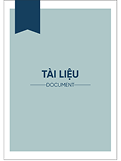Ấn phẩm
Economic role of education in agriculture: evidence from rural Vietnam

Xem mô tả
162
Xem & Tải
15
Nhan đề khác
Tóm tắt
Purpose – This paper investigates the impact of education on output of rice farming households in Vietnam. Design/methodology/approach – Given the literature review, this paper specifies three empirical models (i.e. linear constant coefficient model, partially nonlinear model and linear varied coefficient model) with variables that well describe the mechanism through which education affects output. The data were collected from 901 rice farming households randomly selected out of ten provinces and city in the Mekong River Delta (MRD) of Vietnam. The models are estimated using ordinary least squares (OLS) and Robinson’ s (1988) double residual estimators. Findings – Estimates of the empirical models show that seed, fertilizer, labor and farm size have significant impacts on output of rice farming households while pesticide and herbicide do not. Education is also found to have a positive effect on output of rice farming households because it helps them better manage farms of larger size via combining various inputs in a more desirable way. Originality/value – This paper confirms the positive impact of education on agricultural output, which implies that policies aiming to provide better education to rural people will greatly enhance their income as well as trigger long-term economic and agricultural growth.
Mô tả
agricultural economy
Tác giả
Le, Khuong Ninh
Tác giả khác
Người hướng dẫn
Nơi xuất bản
Nhà xuất bản
Kinh Tế Quốc Dân
Năm xuất bản
2021
ISSN tạp chí
Nhan đề tập
Từ khóa chủ đề
Agriculture , Education , Household , Input , Output , Rice , Rural , Schooling , Vietnam
